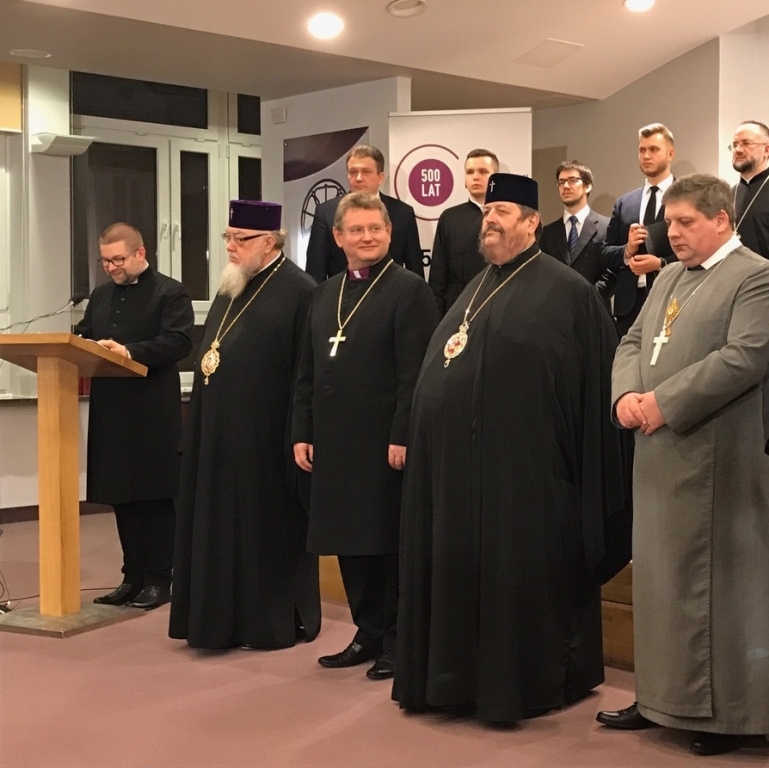Ecumenical New Year Meeting
Ecumenical New Year Meetings take place each year in January. This year’s meeting took place on January 16th in the Lutheran Center in Warsaw and gathered a large group of people engaged in the ecumenical movement and public life in Poland.

Ecumenical New Year Meetings take place each year in January. This year’s meeting took place on January 16th in the Lutheran Center in Warsaw and gathered a large group of people engaged in the ecumenical movement and public life in Poland. The guests were greeted by the director of the Polish Ecumenical Council (PRE), Rev. Grzegorz Giemza.
The speech was given by Rev. Jerzy Samiec, the bishop of the Evangelical Church of the Augsburg Confession in Poland, and the president of the PRE since August 2016. He was talking about jubilees from the previous year: 70th anniversary of PRE, 200th anniversary of the Bible Society in Poland, 1050th anniversary of Polish baptism. He underlined a good cooperation with the Roman Catholic Church in the area of ecumenical services, charitable work and the immigrants’ issue. The bishop reminded i.a. conferences on the topic of migration problems and common message of the PRE Churches and the Roman Catholic Church concerning refugees that was signed in June.
– The Churches have no doubt that the Gospel obliges us to accept refugees, and to treat immigrants who seek better life reasonably and openly. Depreciating this type of migration would mean stigmatizing millions of Poles who left Poland in their search for better life – noted the PRE president.
Bp Samiec mentioned also this year’s anniversary of 500 years of the Reformation. He reminded ecumenical accents in this context. He expressed his gratitude towards regional parliaments that had announced this year the Year of Reformation, and to the Polish president for accepting the patronage over the central celebrations.
The president of the Polish Ecumenical Council related also to the Polish socio-political situation.
– With a deep care we are observing the exacerbating conflicts between the political fractions that result in the division of our society. Radicalization of opinions, which sometimes are extreme, evokes our great concern. Therefore we would like to appeal to all politicians not to give in to their emotions and to weigh their words – he said.
The bishop also added that the majority should be characterized by self-limiting and respecting the rights of the minority.
– I often hear that we have to reject so called “political correctness”. This is a very dangerous tendency because words have great power. “Correctness” is nothing more than defining some behaviors, notions, sentences and words we don’t want to express. Political correctness is our inner breaks, and language shapes our attitudes. Rejecting such canons leads to such behavior that can bring unpredictable and unwanted results. Is not the imperative of love that we find in the New Testament “politically correct”? – noted the PRE president.
He also underlined that both the religious and political leaders should not divide, exclude and humiliate others with their statements.
– We can argue, have different ideas, convictions, values but we have no right to despise the other person – he emphasized.
The Lutheran bishop remined also that since August the Polish Ecumenical Council has new authorities. He expressed his gratitude to the previous president of the PRE, Abp Jeremiasz, for his long standing ecumenical work.
The Apostolic Nuncio to Poland, Abp Salvatore Pennacchio, expressed his greetings. He spoke about the address of pope Francis for the International Day of Peace, migration crisis and recent Lutheran-Catholic commemoration of the Reformation in Lund, with the pope’s participation. Greetings were also expressed by the representatives of the “Signs of Hope” Foundation and the Polish president.
Except the above mentioned participants, among the people who took part in the Ecumenical New Year Meeting were also the heads of the Polish Ecumenical Council member Churches, Jewish community, PRE departments and committees, people of science and media, diplomats, state officials and many other lay people and clergy, engaged in the dialogue and ecumenical movement.